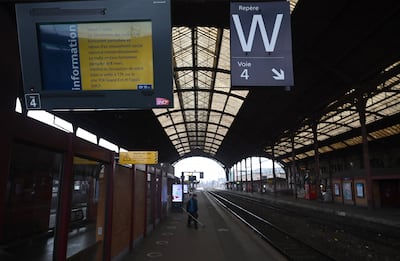Fuel deliveries and oil refining were disrupted at several sites across France on Tuesday as part of a nationwide strike against the government's planned pension reforms.
The CGT union said that shipments were affected as well as refinery operations at some sites operated by TotalEnergies and Esso.
The Gonfreville, Donges, Feyzin, La Mede and Carling sites were affected by the strike, the representative said.
Unions had previously threatened to shut down France’s economy this week in their toughest riposte yet to President Emmanuel Macron’s proposals.
They include raising the minimum retirement age to 64 from 62 and increasing the number of years people have to make contributions for a full pension. A majority of voters reject the reform, according to polls.
“I can understand that not many people want to work two more years, but it's necessary to ensure the viability of the system,” Prime Minister Elisabeth Borne told France 5 TV.
Lorry drivers sporadically blocked major motorway arteries and interchanges in go-slow actions across several French regions on Monday, while an open-ended strike began on the national rail service.
Strikes will spread on Tuesday across several sectors, and protests are planned in cities in several parts of France against the retirement bill, which will require 43 years of work to earn a full pension.
“I call on all the country's employees, citizens and retirees who are against the pensions reform to come out and protest en masse,” the head of the CFDT union Laurent Berger told the France Inter radio station on Monday.
“The President cannot remain deaf” to the protests, he added.
The disruption to fuel deliveries from refineries could see petrol stations running short if the protests continue as unions hope.
Eric Sellini, a CGT union representative at TotalEnergies, told Reuters that a strike currently completely blocking the Gonfreville refinery in Normandy was slated to run until Thursday and at the Donges refinery in western France until Friday.
“We're not giving up. Today we're going to put more than two million people on the street, I am convinced of it,” the head of FO union, Frederic Souillot, told RTL radio. “We will continue until the reform is withdrawn.”
Unions have warned of rolling strikes on public transport that could paralyse parts of the country for weeks.
Police expect 1.1 million to 1.4 million people to hit the streets on Tuesday in more than 260 locations nationwide.
The upper limit of that range would mean stronger opposition than during the five previous days of rallies that have taken place since mid-January.
The biggest day of demonstrations so far saw 1.27 million people demonstrate on January 31, according to official figures.
Demonstrations were already forming early Tuesday morning, with the public road information service reporting that a national road in the city of Rennes had been blocked by around 100 protesters since 1am.
Authorities encouraged people to work from home if possible.
Only one in five regional and high-speed trains are expected to run, while a leading trade unionist representing refinery workers has vowed to bring the French economy “to its knees”.
Schoolteachers are also set to stage walkouts.

Ms Borne told French television on Monday that while she respected the right to protest, a nationwide standstill would primarily penalise “the most fragile” among the population.
The government has argued that the changes are crucial to keep France's pensions system from falling into deep deficit in the coming years.
“If we want to keep this system going, we need to work longer,” Mr Macron said last month.
But unions contest that conclusion and say small increases in contributions could keep it solvent. They also argue that the proposed measures are unfair and would disproportionately affect low-skilled workers in tiring jobs who start their careers early.
According to an Elabe survey, 56 per cent of respondents said they supported rolling strikes and 59 per cent backed the call to bring the country to a standstill.
The bill is now being debated in the upper house of parliament, after two weeks of heated discussions in the lower house that ended without even reaching a vote on raising the retirement age.
Monday's Senate debate dragged on until after 3am on Tuesday, with the body's right-leaning majority shooting down alternative proposals for funding the pensions system fielded by the left. The debate is scheduled to resume at 2.30pm.

The centrist, business-friendly government is hoping to push through the reform in parliament with help from the right, without resorting to a controversial mechanism that would bypass a parliamentary vote but risk fuelling more protests.
Opponents, which opinion polls suggest include a majority of French voters, say the changes threaten hard-fought rights.
Left-wing politicians say companies and the wealthy should pitch in more to keep the system afloat.
The draft law has prompted the liveliest debate in years in the French parliament.
It is currently under discussion in the conservative-led Senate.
The bill is expected to be voted on by the end of the week in the upper house of parliament.
While Mr Macron's camp does not have an absolute majority, it can count on the support of at least part of the conservative Les Republicains.
“I'm telling Emmanuel Macron to hang in there,” LR senator Bruno Retailleau said on Sunday. “If he gives in, he won't be able to carry out more reforms, it would be the end of his (second) term.”
However, it is unclear whether the changes will be approved by parliament by the end of the month or if the government will have to ram them through using special constitutional powers.










